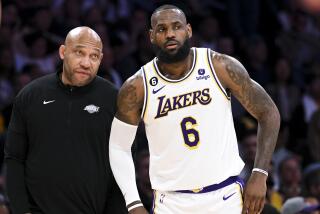Accountability in NHL Seems to Be Lost Art
- Share via
It comes every season like clockwork. No, it’s not the NHL’s latest crackdown on dangerous hits or holdouts by key restricted free agents. Nor is it a new third jersey or higher ticket prices. It is the call for accountability -- a word used in the NHL almost as frequently as “character” and right up there on the list of words that should be forever struck from the vocabulary of hockey players, coaches and management.
Accountability is a catchall term that can, and does, mean different things to different players. It is something that is said to be absent when losing and the key when winning. It rarely can be measured; we just have to believe that on the ice and in the locker room, players are being accountable and being held accountable and holding each other accountable.
As the season began, the word was being thrown about in many NHL cities, in more than a few press conferences and regarding more than a few teams, including the Canucks, Sharks, Flames, Sabres and Lightning.
And if its overwhelming use is creating deaf ears outside those organizations, imagine how much impact it has on players who have been listening to such talk since their early teens.
The team yelling most loudly about accountability so far is, not surprisingly, the Rangers. Coach Glen Sather is trying to implement a system, but his players seem more confused than anything else. The results haven’t come immediately, so the players must be held accountable. But what does that mean to them?
“It means,” says goalie Mike Dunham, “doing what you’re supposed to do, whether it goes good or bad, and admitting if you had a bad game.”
Defenseman Tom Poti agrees. “As an individual, it means you’ve got to go out and get your job done,” he says. “There are different kinds of accountability. You can be working hard but making mistakes. That happens. It’s the mental mistakes you have to try to eliminate.”
The impetus to eliminate those mistakes is at the center of this discussion. The only way to be held accountable is to have consequences -- real, sometimes life-altering, consequences. Of course, they have to be translated into the language of professional sports, where courage is playing with pain and war is when the games get difficult.
So what are consequences in the NHL? They can involve ice time, role and -- for management teams with real backbone and desire for this accountability -- a few high-paid healthy scratches or even putting some longtime NHL players on AHL buses for a while.
Problem is, these things rarely happen. A player with a contract will get paid. A player who has been in the league for a while or who has a one-way contract won’t be sent down. A player might be traded, which could be disruptive, but he still will have the same job at the same pay -- just somewhere else.
So it seems accountability can’t be attained in the NHL. Even coaches who want to make it real frequently fail. Back in 2001-02, Larry Robinson was trying to guide a Devils team after two consecutive trips to the Stanley Cup finals. The team was struggling, and he was being asked to hold his players accountable. But how?
At the time, very few Devils were doing their jobs well. Robinson couldn’t sit 20 guys. He couldn’t take away everybody’s ice time. He couldn’t even scratch veterans in need of a wake-up call from the press box. Doing any of these things would have risked generating mental baggage and possibly losing some players for the rest of the season.
Robinson was stuck. He wanted to create consequences but couldn’t do it adequately. Eventually, he was fired.
That brings to mind a story of another coach caught without options. A group of players tired of its coach, who decided to crack down on anyone breaking team rules, including curfew. Those players would be punished, scratched, maybe even sent down, depending on their seniority. This coach thought he really was cracking his whip. But, said one player as he left the locker room for a night out, “What can he do if everyone misses curfew?”
That coach also was fired. Apparently, there is accountability in this league after all. Sather’s situation is a little different -- he’s also the Rangers’ general manager and is unlikely to fire himself.
Still, how do you sit everybody? How do you play an NHL game with a lineup more suitable for the AHL? How do you get the message across? You talk about accountability and hope someone will hear. Hope someone’s conscience and sense of duty as employee kicks in. Hope the skill of a world-class athlete and love for the game suddenly appear.
You say the word over and over again until it regains its meaning and your players do their jobs. Then, whether the team wins or loses, we the fans win. We never would have to hear the hollow call for accountability again.
More to Read
Go beyond the scoreboard
Get the latest on L.A.'s teams in the daily Sports Report newsletter.
You may occasionally receive promotional content from the Los Angeles Times.






